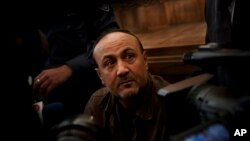RAMALLAH —
Palestinian President Mahmoud Abbas has asked Washington to mediate with Israel for the release of Marwan Barghouti, a Palestinian leader and possible presidential contender jailed a decade ago over a spate of suicide bombings.
Israel agreed last year to free 104 Palestinian prisoners in what it termed a gesture of goodwill to mark the resumption of direct, U.S.-backed peace talks. But Barghouti was excluded from this and occasional previous releases and the talks have since faltered with Washington struggling to keep them alive.
Any move to free such a high-profile figure as Barghouti would probably ignite a political fire storm in Israel. By the same token, it would shore up Palestinian President Mahmoud Abbas's standing at home and help give him domestic cover to carry on the as-yet unproductive talks with Israel.
A Palestinian official said Abbas had written to the United States asking them to bring about the release of ill prisoners, female inmates and minors, as well as Barghouti and two other high-profile leaders - Ahmed Sa'adat and Fouad Al-Shobaki.
“The president renewed his demand during the recent meetings in Washington,” said Qadoura Fares, chairman of the Palestinian Prisoner Club, referring to Abbas's trip to Washington this week to discuss the shaky peace process with President Barack Obama.
An Israeli court sentenced Barghouti to five life sentences and 40 years in jail in 2004, finding him guilty of orchestrating ambushes and suicide attacks during the Palestinian Intifada, or uprising, that was raging at the time.
Barghouti, now 54, has always denied the charges and he remains a highly popular figure among ordinary Palestinians, portrayed by his supporters as a Nelson Mandela-like figure who could galvanize and reunite their divided political landscape.
More than 70 of the prisoners Israel agreed to release have gone free since peace negotiations resumed in July and Palestinians are pushing for the final batch to be released by the end of this month.
However, the peace talks have made little progress and Washington is trying to set guidelines to keep them going beyond the original April 29 target date for a deal.
There was no immediate comment from Israel on the Palestinian request. Israeli Prime Minister Benjamin Netanyahu is already facing internal political resistance to any further prisoner releases given the apparent talks deadlock.
Israel has refused to free Barghouti in the past, leaving him out of a prisoner swap struck with the Islamist group Hamas in 2011, which saw some 1,000 Palestinian inmates go free.
Many Palestinians see the charismatic Barghouti, a senior member of Abbas's Fatah movement, as a top contender to succeed Abbas, who is 78 and has no designated deputy.
Barghouti was a leading activist in both the first and second Palestinian uprisings against Israel.
Born in the West Bank, he supports the idea of an end to the Middle East conflict through the establishment of a Palestinian state in the West Bank, the Gaza Strip and East Jerusalem - territory occupied by Israel in 1967.
Israel agreed last year to free 104 Palestinian prisoners in what it termed a gesture of goodwill to mark the resumption of direct, U.S.-backed peace talks. But Barghouti was excluded from this and occasional previous releases and the talks have since faltered with Washington struggling to keep them alive.
Any move to free such a high-profile figure as Barghouti would probably ignite a political fire storm in Israel. By the same token, it would shore up Palestinian President Mahmoud Abbas's standing at home and help give him domestic cover to carry on the as-yet unproductive talks with Israel.
A Palestinian official said Abbas had written to the United States asking them to bring about the release of ill prisoners, female inmates and minors, as well as Barghouti and two other high-profile leaders - Ahmed Sa'adat and Fouad Al-Shobaki.
“The president renewed his demand during the recent meetings in Washington,” said Qadoura Fares, chairman of the Palestinian Prisoner Club, referring to Abbas's trip to Washington this week to discuss the shaky peace process with President Barack Obama.
An Israeli court sentenced Barghouti to five life sentences and 40 years in jail in 2004, finding him guilty of orchestrating ambushes and suicide attacks during the Palestinian Intifada, or uprising, that was raging at the time.
Barghouti, now 54, has always denied the charges and he remains a highly popular figure among ordinary Palestinians, portrayed by his supporters as a Nelson Mandela-like figure who could galvanize and reunite their divided political landscape.
More than 70 of the prisoners Israel agreed to release have gone free since peace negotiations resumed in July and Palestinians are pushing for the final batch to be released by the end of this month.
However, the peace talks have made little progress and Washington is trying to set guidelines to keep them going beyond the original April 29 target date for a deal.
There was no immediate comment from Israel on the Palestinian request. Israeli Prime Minister Benjamin Netanyahu is already facing internal political resistance to any further prisoner releases given the apparent talks deadlock.
Israel has refused to free Barghouti in the past, leaving him out of a prisoner swap struck with the Islamist group Hamas in 2011, which saw some 1,000 Palestinian inmates go free.
Many Palestinians see the charismatic Barghouti, a senior member of Abbas's Fatah movement, as a top contender to succeed Abbas, who is 78 and has no designated deputy.
Barghouti was a leading activist in both the first and second Palestinian uprisings against Israel.
Born in the West Bank, he supports the idea of an end to the Middle East conflict through the establishment of a Palestinian state in the West Bank, the Gaza Strip and East Jerusalem - territory occupied by Israel in 1967.





